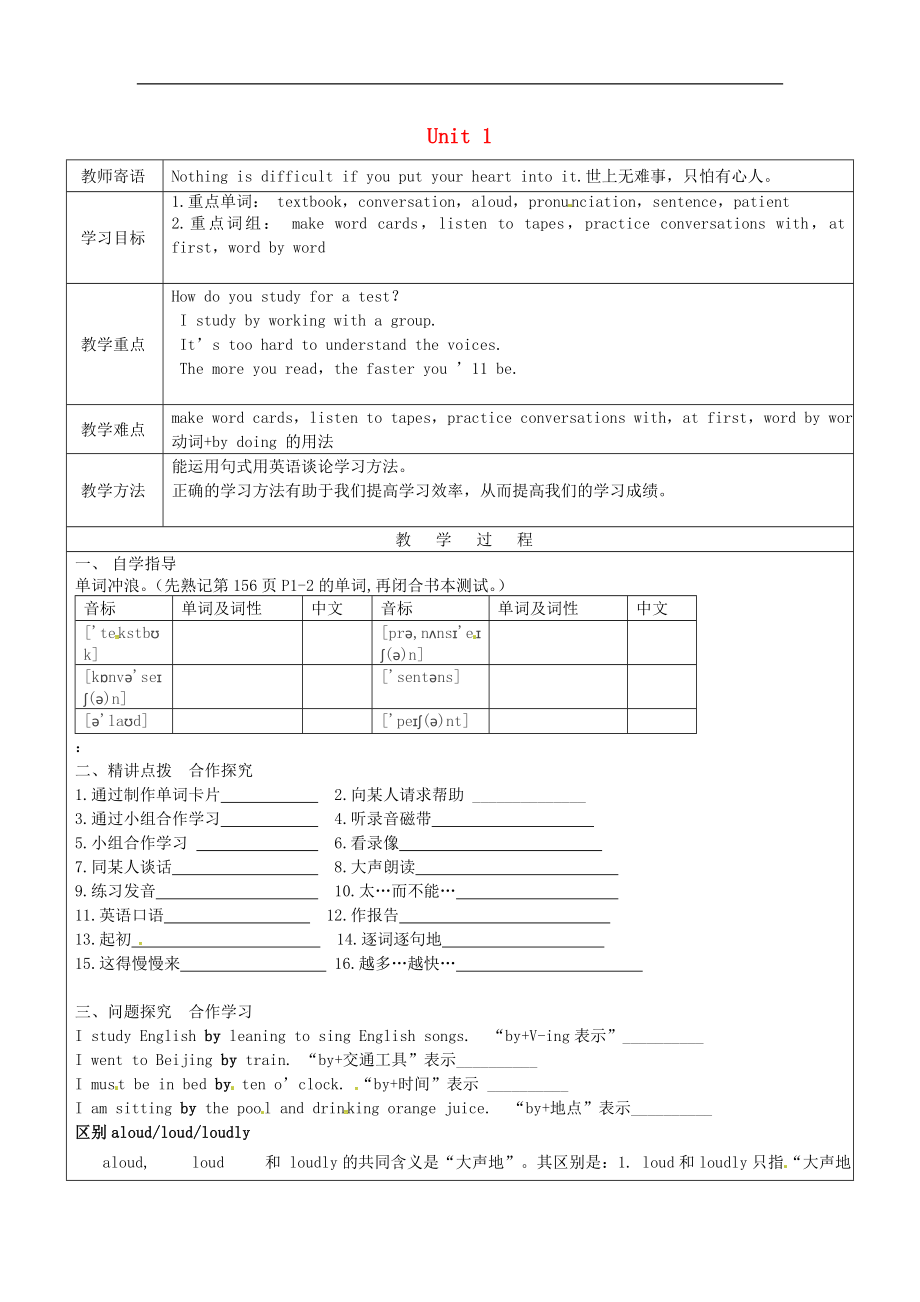《山東省廣饒縣丁莊鎮(zhèn)中心初級(jí)中學(xué)九年級(jí)英語全冊(cè) Unit 1 How can we become good learners Section A學(xué)案1(無答案)(新版)人教新目標(biāo)版》由會(huì)員分享���,可在線閱讀,更多相關(guān)《山東省廣饒縣丁莊鎮(zhèn)中心初級(jí)中學(xué)九年級(jí)英語全冊(cè) Unit 1 How can we become good learners Section A學(xué)案1(無答案)(新版)人教新目標(biāo)版(2頁珍藏版)》請(qǐng)?jiān)谘b配圖網(wǎng)上搜索����。
1、
Unit 1
教師寄語
Nothing is difficult if you put your heart into it.世上無難事�,只怕有心人。
學(xué)習(xí)目標(biāo)
1.重點(diǎn)單詞: textbook�,conversation,aloud����,pronunciation���,sentence,patient
2.重點(diǎn)詞組: make word cards�,listen to tapes,practice conversations with��,at first�����,word by word
教學(xué)重點(diǎn)
How do you study for a test�����?
I study by wor
2�、king with a group.
It’s too hard to understand the voices.
The more you read,the faster you ’11 be.
教學(xué)難點(diǎn)
make word cards��,listen to tapes���,practice conversations with�,at first���,word by word
動(dòng)詞+by doing 的用法
教學(xué)方法
能運(yùn)用句式用英語談?wù)搶W(xué)習(xí)方法�。
正確的學(xué)習(xí)方法有助于我們提高學(xué)習(xí)效率,從而提高我們的學(xué)習(xí)成績(jī)�����。
教 學(xué) 過 程
一�����、 自學(xué)指導(dǎo)
單詞沖
3�����、浪����。(先熟記第156頁P(yáng)1-2的單詞,再閉合書本測(cè)試��。)
音標(biāo)
單詞及詞性
中文
音標(biāo)
單詞及詞性
中文
['tekstb?k]
[pr?,n?ns?'e??(?)n]
[k?nv?'se??(?)n]
['sent?ns]
[?'la?d]
['pe??(?)nt]
:
二�����、精講點(diǎn)撥 合作探究
1.通過制作單詞卡片 2.向某人請(qǐng)求幫助 ______________
3.通過小組合作學(xué)習(xí) 4.聽錄音磁帶
5
4�、.小組合作學(xué)習(xí) 6.看錄像
7.同某人談話 8.大聲朗讀
9.練習(xí)發(fā)音 10.太…而不能…
11.英語口語 12.作報(bào)告
13.起初 14.逐詞逐句地
15.
5、這得慢慢來 16.越多…越快…
三����、問題探究 合作學(xué)習(xí)
I study English by leaning to sing English songs. “by+V-ing表示”__________
I went to Beijing by train. “by+交通工具”表示__________
I must be in bed by ten o’clock. “by+時(shí)間”表示 __________
I am sitting by the pool and drinking orange
6�����、 juice. “by+地點(diǎn)”表示__________
區(qū)別aloud/loud/loudly
aloud,?? loud?? 和 loudly的共同含義是“大聲地”�。其區(qū)別是:1. loud和loudly只指“大聲地���,高聲地”�;而aloud除指“大聲地”外���,還可指“出聲地”�����。另外loudly還暗含喧鬧的意味����。2. aloud作“出聲地”解時(shí)���,主要與read, think等連用�����,作“大聲地”解時(shí)����,主要與call, shout, cry等連用;而loud主要與talk, speak, sing, laugh等連用�;loudly則可與任何發(fā)出聲響的動(dòng)詞(如:bring, explode, k
7、nock���,ring, insist, demand, explain等)連用�����。3. loud和aloud只能用在動(dòng)詞后面�;而loudly則既可用在動(dòng)詞后���,也可用在動(dòng)詞前。另外����,loud側(cè)重狀態(tài)和給人的感覺;而loudly則側(cè)重方式�。試比較:
He read his sister's letter aloud. 他喃喃地讀他妹妹的信。
Speak louder, please, or no one hear you. 請(qǐng)?jiān)俅舐曅?,否則��,沒人能聽見����。
Suddenly the bell on the wall rang loudly. 突然�����,墻上的鈴大聲地響起來�。
四、能力提
8���、升 課堂訓(xùn)練�����、
根據(jù)句意及首字母提示補(bǔ)全單詞�。
1 .Our new English teacher is very nice and p__________ with us.
2.Do you learn English by having c__________ with friends in English every day?
3 .I don’t know how to use the words to make s_____________.
4. Lily��,could you please read the textbook a_____________�����?
5 .
9、Getting the p_____________ of English words clear is very important.
五�、 課下作業(yè)
( )1. 1 think you can _____________ our math teacher_____________ help.
A. ask;for B. find�;for C. ask;from D. find����;from
( )2.一_____________ do you know so much about the UFO?
一I usually get the information by
10、 surfing the Internet.
A. How B. What C. Which D. Where
( )3.一How do you communicate with your friends? -By_____________ letters.
A. write B. writing C. to write D. written
( )4.一___________ you ever_____________ Chinese dumplings���,Bonnie?
一Yes���,I have. They are really delicious.
A. Do;try B. Will�;try C. Did;try D. Have����;tried
( )5. He knows_____________ about MH370.
A. lots of B. lot of C. a lot of D. a lot
教 學(xué) 反 思
2
 山東省廣饒縣丁莊鎮(zhèn)中心初級(jí)中學(xué)九年級(jí)英語全冊(cè) Unit 1 How can we become good learners Section A學(xué)案1(無答案)(新版)人教新目標(biāo)版
山東省廣饒縣丁莊鎮(zhèn)中心初級(jí)中學(xué)九年級(jí)英語全冊(cè) Unit 1 How can we become good learners Section A學(xué)案1(無答案)(新版)人教新目標(biāo)版

